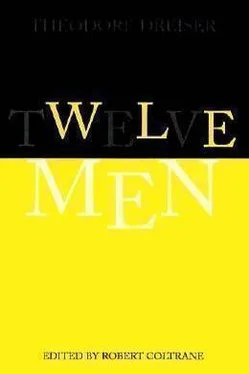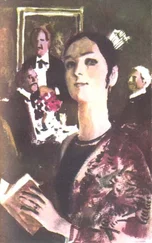Теодор Драйзер - Twelve Men
Здесь есть возможность читать онлайн «Теодор Драйзер - Twelve Men» весь текст электронной книги совершенно бесплатно (целиком полную версию без сокращений). В некоторых случаях можно слушать аудио, скачать через торрент в формате fb2 и присутствует краткое содержание. Год выпуска: 2014, Издательство: epubBooks Classics, Жанр: Биографии и Мемуары, на английском языке. Описание произведения, (предисловие) а так же отзывы посетителей доступны на портале библиотеки ЛибКат.
- Название:Twelve Men
- Автор:
- Издательство:epubBooks Classics
- Жанр:
- Год:2014
- ISBN:нет данных
- Рейтинг книги:4 / 5. Голосов: 1
-
Избранное:Добавить в избранное
- Отзывы:
-
Ваша оценка:
- 80
- 1
- 2
- 3
- 4
- 5
Twelve Men: краткое содержание, описание и аннотация
Предлагаем к чтению аннотацию, описание, краткое содержание или предисловие (зависит от того, что написал сам автор книги «Twelve Men»). Если вы не нашли необходимую информацию о книге — напишите в комментариях, мы постараемся отыскать её.
Twelve Men — читать онлайн бесплатно полную книгу (весь текст) целиком
Ниже представлен текст книги, разбитый по страницам. Система сохранения места последней прочитанной страницы, позволяет с удобством читать онлайн бесплатно книгу «Twelve Men», без необходимости каждый раз заново искать на чём Вы остановились. Поставьте закладку, и сможете в любой момент перейти на страницу, на которой закончили чтение.
Интервал:
Закладка:
"I think we ought to get together and have some sort of a conference about the letting of contracts," said the president of the city council to him one morning shortly after he had been installed. "You will find these gentlemen ready to meet you half–way in these matters."
"I'm very glad to hear that," he replied. "I've something to say in my message to the council, which I'll send over in the morning."
The old–time politician eyed him curiously, and he eyed the old–time politician in turn, not aggressively, but as if they might come to a very pleasant understanding if they wanted to, and then went back to his office.
The next day his message was made public, and this was its key–note:
"All contract work for the city should be let with a proviso, that the workmen employed receive not less than two dollars a day."
The dissatisfied roar that followed was not long in making itself heard all over the city.
"Stuff and nonsense," yelled the office jobbers in a chorus. "Socialism!" "Anarchy!" "This thing must be put down!" "The city would be bankrupt in a year." "No contractor could afford to pay his ordinary day laborers two a day. The city could not afford to pay any contractor enough to do it."
"The prosperity of the city is not greater than the prosperity of the largest number of its component individuals," replied the mayor, in a somewhat altruistic and economically abstruse argument on the floor of the council hall. "We must find contractors."
"We'll see about that," said the members of the opposition. "Why, the man's crazy. If he thinks he can run this town on a goody–good basis and make everybody rich and happy, he's going to get badly fooled, that's all there is to that."
Fortunately for him three of the eight council members were fellows of the mayor's own economic beliefs, individuals elected on the same ticket with him. These men could not carry a resolution, but they could stop one from being carried over the mayor's veto. Hence it was found that if the contracts could not be given to men satisfactory to the mayor they could not be given at all, and he stood in a fair way to win.
"What the hell's the use of us sitting here day after day!" were the actual words of the leading members of the opposition in the council some weeks later, when the fight became wearisome. "We can't pass the contracts over his veto. I say let 'em go."
So the proviso was tacked on, that two a day was the minimum wage to be allowed, and the contracts passed.
The mayor's followers were exceedingly jubilant at this, more so than he, who was of a more cautious and less hopeful temperament.
"Not out of the woods yet, gentlemen," he remarked to a group of his adherents at the reform club. "We have to do a great many things sensibly if we expect to keep the people's confidence and 'win again.'"
Under the old system of letting contracts, whenever there was a wage rate stipulated, men were paid little or nothing, and the work was not done. There was no pretense of doing it. Garbage and ashes accumulated, and papers littered the streets. The old contractor who had pocketed the appropriated sum thought to do so again.
"I hear the citizens are complaining as much as ever," said the mayor to this individual one morning. "You will have to keep the streets clean."
The contractor, a robust, thick–necked, heavy–jawed Irishman, of just so much refinement as the sudden acquisition of a comfortable fortune would allow, looked him quizzically over, wondering whether he was "out" for a portion of the appropriation or whether he was really serious.
"We can fix that between us," he said.
"There's nothing to fix," replied the mayor. "All I want you to do is to clean the streets."
The contractor went away and for a few days after the streets were really clean, but it was only for a few days.
In his walks about the city the mayor himself found garbage and paper uncollected, and then called upon his new acquaintance again.
"I'm mentioning this for the last time, Mr. M―," he said. "You will have to fulfill your contract, or resign in favor of some one who will."
"Oh, I'll clean them, well enough," said this individual, after five minutes of rapid fire explanation. "Two dollars a day for men is high, but I'll see that they're clean."
Again he went away, and again the mayor sauntered about, and then one morning sought out the contractor in his own office.
"This is the end," he said, removing a cigar from his mouth and holding it before him with his elbow at right angles. "You are discharged from this work. I'll notify you officially to–morrow."
"It can't be done the way you want it," the contractor exclaimed with an oath. "There's no money in it at two dollars. Hell, anybody can see that."
"Very well," said the mayor in a kindly well–modulated tone. "Let another man try, then."
The next day he appointed a new contractor, and with a schedule before him showing how many men should be employed and how much profit he might expect, the latter succeeded. The garbage was daily removed, and the streets carefully cleaned.
Then there was a new manual training school about to be added to the public school system at this time, and the contract for building was to be let, when the mayor threw a bomb into the midst of the old–time jobbers at the city council. A contractor had already been chosen by them and the members were figuring out their profits, when at one of the public discussions of the subject the mayor said:
"Why shouldn't the city build it, gentlemen?"
"How can it?" exclaimed the councilmen. "The city isn't an individual; it can't watch carefully."
"It can hire its own architect, as well as any contractor. Let's try it."
There were sullen tempers in the council chamber after this, but the mayor was insistent. He called an architect who made a ridiculously low estimate. Never had a public building been estimated so cheaply before.
"See here," said one of the councilmen when the plans were presented to the chamber—"This isn't doing this city right, and the gentlemen of the council ought to put their feet down on any such venture as this. You're going to waste the city's money on some cheap thing in order to catch votes."
"I'll publish the cost of the goods as delivered," said the mayor. "Then the people can look at the building when it's built. We'll see how cheap it looks then."
To head off political trickery on the part of the enemy he secured bills for material as delivered, and publicly compared them with prices paid for similar amounts of the same material used in other buildings. So the public was kept aware of what was going on and the cry of cheapness for political purposes set at naught. It was the first public structure erected by the city, and by all means the cheapest and best of all the city's buildings.
Excellent as these services were in their way, the mayor realized later that a powerful opposition was being generated and that if he were to retain the interest of his constituents he would have to set about something which would endear him and his cause to the public.
"I may be honest," he told one of his friends, "but honesty will play a lone hand with these people. The public isn't interested in its own welfare very much. It can't be bothered or hasn't the time. What I need is something that will impress it and still be worth while. I can't be reëlected on promises, or on my looks, either."
When he looked about him, however, he found the possibility of independent municipal action pretty well hampered by mandatory legislation. He had promised, for instance, to do all he could to lower the exorbitant gas rate and to abolish grade crossings, but the law said that no municipality could do either of these things without first voting to do so three years in succession—a little precaution taken by the corporation representing such things long before he came into power. Each vote must be for such contemplated action, or it could not become a law.
Читать дальшеИнтервал:
Закладка:
Похожие книги на «Twelve Men»
Представляем Вашему вниманию похожие книги на «Twelve Men» списком для выбора. Мы отобрали схожую по названию и смыслу литературу в надежде предоставить читателям больше вариантов отыскать новые, интересные, ещё непрочитанные произведения.
Обсуждение, отзывы о книге «Twelve Men» и просто собственные мнения читателей. Оставьте ваши комментарии, напишите, что Вы думаете о произведении, его смысле или главных героях. Укажите что конкретно понравилось, а что нет, и почему Вы так считаете.









